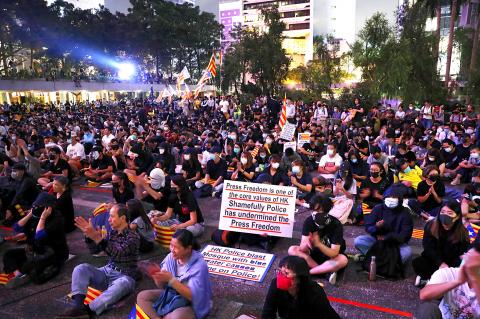Hong Kong protesters yesterday rallied in support of demonstrators pushing for a separate Catalonia in northeastern Spain as a Chinese official denounced months of “mad violence” in Hong Kong and forces pushing for independence.
The protests in Spain’s wealthiest region of Catalonia bear some resemblances to the demonstrations in Chinese-ruled Hong Kong, where millions have taken to the streets over five months to vent their anger over what they see as Beijing’s tightening grip on the territory.
Most protesters in Hong Kong want greater democracy, among other demands, although a small minority is calling for independence, a red line for Chinese Communist Party leaders in Beijing.

Photo: EPA-EFE
“It has become more and more clear that it is not a peaceful demonstration in Hong Kong at all, but a violent crime that is mad,” Xie Feng (謝鋒), the commissioner for the Chinese Ministry of Foreign Affairs in Hong Kong, said in a speech yesterday.
“The real purpose of the Hong Kong opposition and the foreign forces behind it is to disrupt Hong Kong, overthrow the legitimate government and seize the power of governance. It is to turn Hong Kong into an independent or semi-independent political entity and subvert ‘one country, two systems,’” he said. “This is a delusion. Hong Kong is China’s Hong Kong.”
Under the terms of the 1997 handover from Britain, Hong Kong was allowed to retain extensive freedoms not enjoyed in mainland China under the “one country, two systems” formula, including an independent judiciary and the right to protest.
However, many Hong Kong residents are angry at what they see as a relentless march toward Chinese control.
A poster advertising yesterday’s demonstration of solidarity with protesters in Catalonia featured the slogan: “United We Stand Against Tyranny.”
Organizers called on people to rally from 7pm at Chater Garden in the heart of the territory.
Their rally is one of the few to have obtained a permit from authorities in the past several weeks.
Independence is a highly divisive issue in Catalonia, which has more than 7 million inhabitants, its own language, legislature and flag.
Some demonstrators waved the Catalan flag at a protest in Hong Kong on Sunday.
Students in Catalonia have boycotted classes and protesters have focused on strategic targets to cause maximum disruption, including the airport serving Barcelona — similar to strategies used by Hong Kong activists.
Demonstrators in Catalonia, who protested for nine consecutive nights from Monday last week, are angry over the conviction of their leaders for sedition and at what they see as attempts to thwart their ambition for greater autonomy from the rest of Spain.
Some Hong Kong protesters went online to urge people not to attend yesterday’s show of support for the Catalan movement, saying that it was too provocative and risked denting international support for their own cause.
Hong Kong authorities in September last year formally banned a group promoting independence from China, the first time a political organization has been outlawed since the 1997 handover.
The Hong Kong Legislative Council on Wednesday formally withdrew planned legislation that would have allowed extraditions to China, a bill that triggered the unrest, but the move was unlikely to end the protests, because it met just one of the pro-democracy demonstrators’ five demands, which include universal suffrage.

CHAMPIONS: President Lai congratulated the players’ outstanding performance, cheering them for marking a new milestone in the nation’s baseball history Taiwan on Sunday won their first Little League Baseball World Series (LLBWS) title in 29 years, as Taipei’s Dong Yuan Elementary School defeated a team from Las Vegas 7-0 in the championship game in South Williamsport, Pennsylvania. It was Taiwan’s first championship in the annual tournament since 1996, ending a nearly three-decade drought. “It has been a very long time ... and we finally made it,” Taiwan manager Lai Min-nan (賴敏男) said after the game. Lai said he last managed a Dong Yuan team in at the South Williamsport in 2015, when they were eliminated after four games. “There is

Chinese Nationalist Party (KMT) lawmakers have declared they survived recall votes to remove them from office today, although official results are still pending as the vote counting continues. Although final tallies from the Central Election Commission (CEC) are still pending, preliminary results indicate that the recall campaigns against all seven KMT lawmakers have fallen short. As of 6:10 pm, Taichung Legislators Yen Kuan-heng (顏寬恒) and Yang Chiung-ying (楊瓊瓔), Hsinchu County Legislator Lin Szu-ming (林思銘), Nantou County Legislator Ma Wen-chun (馬文君) and New Taipei City Legislator Lo Ming-tsai (羅明才) had all announced they

Nvidia Corp CEO Jensen Huang (黃仁勳) yesterday visited Taiwan Semiconductor Manufacturing Co (TSMC, 台積電), as the chipmaker prepares for volume production of Nvidia’s next-generation artificial intelligence (AI) chips. It was Huang’s third trip to Taiwan this year, indicating that Nvidia’s supply chain is deeply connected to Taiwan. Its partners also include packager Siliconware Precision Industries Co (矽品精密) and server makers Hon Hai Precision Industry Co (鴻海精密) and Quanta Computer Inc (廣達). “My main purpose is to visit TSMC,” Huang said yesterday. “As you know, we have next-generation architecture called Rubin. Rubin is very advanced. We have now taped out six brand new

POWER PLANT POLL: The TPP said the number of ‘yes’ votes showed that the energy policy should be corrected, and the KMT said the result was a win for the people’s voice The government does not rule out advanced nuclear energy generation if it meets the government’s three prerequisites, President William Lai (賴清德) said last night after the number of votes in favor of restarting a nuclear power plant outnumbered the “no” votes in a referendum yesterday. The referendum failed to pass, despite getting more “yes” votes, as the Referendum Act (公民投票法) states that the vote would only pass if the votes in favor account for more than one-fourth of the total number of eligible voters and outnumber the opposing votes. Yesterday’s referendum question was: “Do you agree that the Ma-anshan Nuclear Power Plant